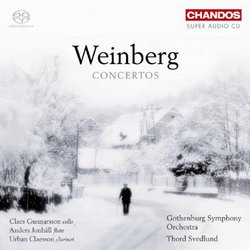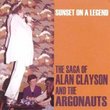| All Artists: Gunnarsson, Jonhall, Claesson Title: Mieczyslaw Weinberg: Concertos Members Wishing: 0 Total Copies: 0 Label: Chandos Original Release Date: 1/1/2008 Re-Release Date: 6/24/2008 Album Type: Hybrid SACD - DSD Genre: Classical Styles: Forms & Genres, Concertos, Instruments, Reeds & Winds, Symphonies Number of Discs: 1 SwapaCD Credits: 1 UPC: 095115506424 |
Search - Gunnarsson, Jonhall, Claesson :: Mieczyslaw Weinberg: Concertos
CD DetailsSimilar CDs |
CD ReviewsNordic Orchestras and Modern Composers B. R. Merrick | 08/08/2009 (5 out of 5 stars) "The two go hand-in-hand. The last few years of browsing and buying great and lesser-known modern (and post-modern) composers played by orchestras from Sweden, Iceland, Finland, etc. have been fruitful and blessed. Amen to everything J. Scott Morrison said in his review. These are wonderful works. The Fantasia (for cello and orchestra) is more tonally-based than the other works, and certainly lovely (especially the opening harmonies), but the two flute concertos, while more modern, never forget what the essential nature of the flute is. The soloist (Anders Jonhäll) never has to leave the beautiful garden that Weinberg wrote. Neither is the all-string accompaniment to Urban Claesson's clarinet any sort of disappointment. The orchestra is well-balanced with the soloists on all four works here, and highly sensitive and able players at that. Weinberg shouldn't be so obscure. Take a listen." A Cello Concerto Worthy of Repertoire Status J Scott Morrison | Middlebury VT, USA | 10/17/2008 (5 out of 5 stars) "Mieczyslaw Weinberg (sometimes spelt Vainberg; 1919-1996) is getting a good deal of attention these days, and for good reason. He studied in Warsaw and later Minsk, and became a close friend of Shostakovich; of meeting Shostakovich he reportedly said, 'It was as if I had been born anew.' His music certainly bears more than a trace of Shostakovian influence, although there is much less sarcasm and angst in his music.
This CD contains four concertos, two for flute, one for clarinet, and best of all an absolutely gorgeous cello concerto (called a Fantasia for Cello and Orchestra). All of these pieces are very good and they are given stellar performances on this disc. The cello concerto (1951-53) is unfailingly mellifluous, cleverly constructed (it is in three movements played without pause), and sounds like it must be extraordinarily grateful to play. Its silken melodies stick in the ear, the middle section has gypsy, or at least folk-like, elements, and the Adagio finale section is moving. I frankly think this concerto deserves to join the fairly small ranks of popular and often-played cello concertos. Cellist Claes Gunnarsson plays it as to the manner born. The two flute concertos - No. 1 for flute and string orchestra (1961) and No. 2 for flute and full orchestra (1987) -- have more than a passing resemblance to Nielsen's concerto for that instrument, but don't quite have the vehement outbursts of the Nielsen. Weinberg's sly sense of humor is displayed in the Second Concerto's finale when he quotes two the repertoire's most famous flute passages, Gluck's 'Dance of the Blessed Spirits' and Bach's 'Badinerie' from the Second Orchestral Suite. Both concerti combine pastoral and rather darker elements. The Second Concerto receives its first recording here and flutist Anders Jonhäll is a fine exponent of both concerti. Also receiving its first recording is the Concerto for Clarinet and String Orchestra (1970). Again one is reminded a bit of Nielsen's Clarinet Concerto by some of the recurring major second trills and the inventive use of the instrument's extreme registers. But Weinberg's work is more dissonant and emphatic, not to speak of unremittingly virtuosic. In the typical fast - slow - fast configuration, the emotional center of the work is the Andante which is both warmer and less spiky than the outer movements. The Finale contains dance elements and a daunting cadenza. Clarinetist Urban Claesson is superb. In all four concertos the fabled Gothenburg Symphony (now labeled the National Orchestra of Sweden) plays as if they had been playing these works all their lives, although surely these are new works for them. The conductor is a new name for me, Thord Svedlund. He apparently has been a violinist in the Göteborg orchestra for two decades. He certainly gets expert performances from his colleagues. Highly recommended. Scott Morrison" |


